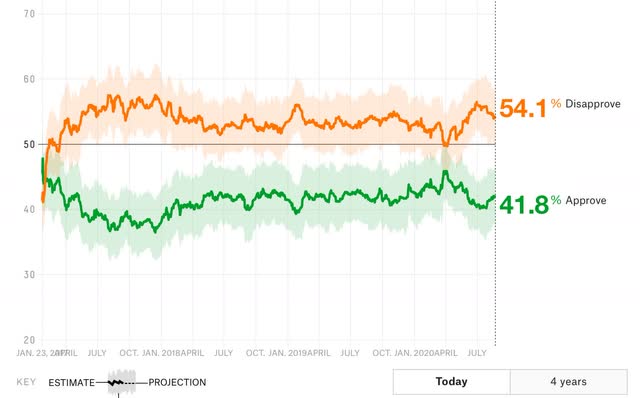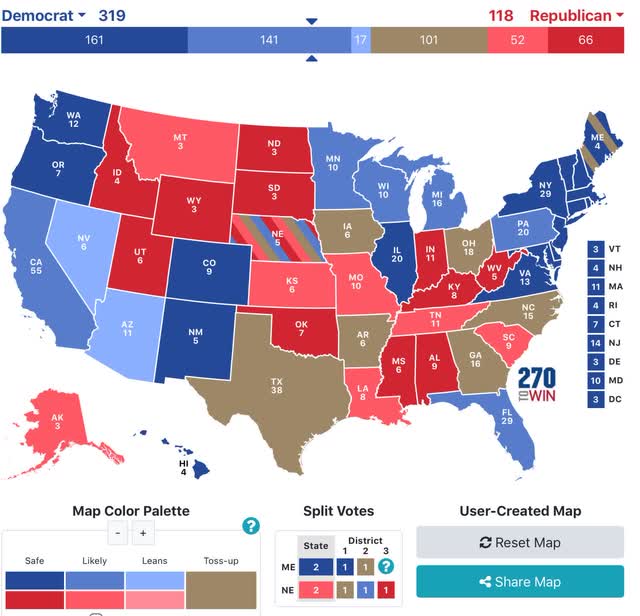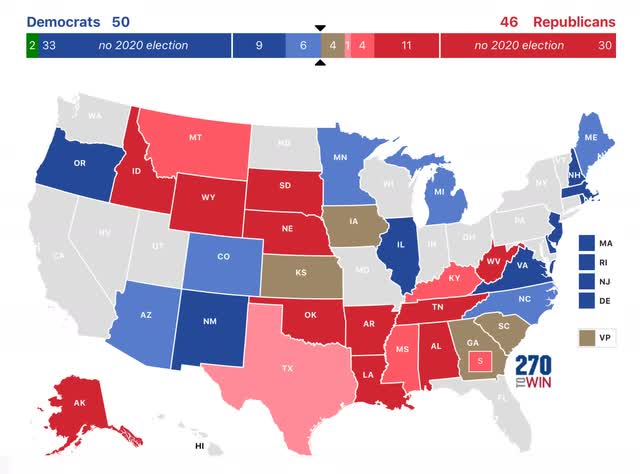The 2020 Presidential and Senate polling nowcast: partisan positions continue to harden Here is my weekly update on the 2020 elections, based on State rather than national polling in the past 30 days, since that directly reflects what is likely to happen in the Electoral College. Remember that polls are really only nowcasts, not forecasts. They are snapshots of the present; there is no guarantee they will be identical or nearly identical in early November. As I have frequently noted, Trump’s approval has always reverted to the mean, absent a new outrage that is both unusually cruel and simultaneously unusually inept. Since there has been none in the past few weeks, Trump’s margin has reverted by 2% for both approval and disapproval: While Trump’s
Topics:
NewDealdemocrat considers the following as important: Featured Stories, Journalism, politics
This could be interesting, too:
Robert Skidelsky writes Lord Skidelsky to ask His Majesty’s Government what is their policy with regard to the Ukraine war following the new policy of the government of the United States of America.
Joel Eissenberg writes No Invading Allies Act
Ken Melvin writes A Developed Taste
Bill Haskell writes The North American Automobile Industry Waits for Trump and the Gov. to Act
The 2020 Presidential and Senate polling nowcast: partisan positions continue to harden
Here is my weekly update on the 2020 elections, based on State rather than national polling in the past 30 days, since that directly reflects what is likely to happen in the Electoral College. Remember that polls are really only nowcasts, not forecasts. They are snapshots of the present; there is no guarantee they will be identical or nearly identical in early November.
As I have frequently noted, Trump’s approval has always reverted to the mean, absent a new outrage that is both unusually cruel and simultaneously unusually inept. Since there has been none in the past few weeks, Trump’s margin has reverted by 2% for both approval and disapproval:

While Trump’s transparent trashing of the Postal Service in order to thwart voting by mail is certainly cruel, the cruelty has not been delivered ineptly, so there has been no penalty in the polls.
Next, here is the updated map through August 22. To refresh, here is how it works:
– States where the race is closer than 3% are shown as toss-ups.
– States where the range is between 3% to 5% are light colors.
– States where the range is between 5% and 10% are medium colors.
– States where the candidate is leading by 10% plus are dark colors.

This week saw Arizona weakening from “likely” to “lean” Biden, and Alaska moves from “lean” to “likely” Trump. Additionally, in the past four weeks, North Carolina has moved steadily from “lean Biden” to toss-up, and at present for the first time, Trump slightly leads, although not by enough to move it to “lean Trump” at this point.
On the other hand, once again, despite heavy polling, Georgia, North Carolina, Ohio, and even Texas remain in the toss-up category – and Florida remains firmly in the “likely Biden” category.
There are a few States where I have had to rely on older polling, and really need to be updated, notably Nevada, Arkansas, and West Virginia.
Nevertheless, based on the current map Biden just has to win the “solid” and “likely” States, and need not win any of the “lean Biden” States, in order to win the election.
I continue to be of the opinion that Trump has 2 weeks left – until Labor Day – to work a miracle with the coronavirus pandemic. If it is about where it is now, then the economic fundamentals + the casualties from the pandemic indicate that Biden will win the popular vote in November, although the race seems likely to tighten somewhat, because the short leading economic indicators have been suggesting the economy will continue to improve somewhat.
The Senate map is similarly further solidifying in line with the Presidential election map, as shown below, using the same % cutoffs as for the Presidential map:

With the exception of Montana, which moves from “lean” to “likely” GOP, all of the other changes in the Senate map this week benefit the Democrats. Cornyn’s seat in Texas moves from “likely” to “lean” GOP. McConnell’s seat in Kentucky moves from “solid” to “likely” GOP. And most importantly, Lindsey Graham’s seat in South Carolina moves from “lean” GOP to “toss-up.”
Based on this map, if Democrats simply win all those seats rated “solid” and “likely,” they will have the 50 Senate seats necessary for a technical majority. If they were to win the “toss-ups” and “lean GOP” races as well, they could end up with as many as 55 Senate seats.
